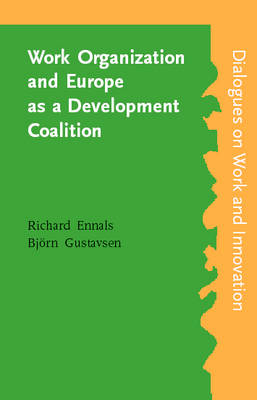Dialogues on Work and Innovation
3 primary works
Book 3
Concept-Driven Development and the Organization of the Process of Change
by Bjorn Gustavsen, Bernd Hofmaier, Marianne Ekman Philips, and Anders Wikman
Published 1 January 1996
The Swedish Working Life Fund — a temporary organization functioning from 1990 to 1995 — distributed 10 billion Swedish crowns for workplace development and initiated 25,000 projects. About half of the total labor market was affected. This evaluation study, which is built on case studies as well as a survey of a representative sample of the project population, describes the emergent characteristics of organization development in Swedish enterprises and services. In order to locate the efforts of the Fund within an explanatory context, the study draws on the idea of concept-driven change, of participation in development processes, of development coalitions, of infrastructure for change and of a society, that is supportive of change.
Book 7
Work Organization and Europe as a Development Coalition
by Professor Richard Ennals and Bjorn Gustavsen
Published 15 March 1999
Work Organization has achieved recent prominence in European policy, as new employment guidelines are embodied in the policies of all European Member States. New forms of Work Organization, properly understood, offer collaborative competitive advantage to European enterprises. This book, based on decades of action research in separate European nations, identifies the research background from which these new insights and policy initiatives have emerged, with continuing lessons to be learned from differences.
Work Organization is the missing link which enables innovation and training to produce sustainable increases in productivity: this is not mere academic theory but also vital practical business. The book launches a new European research agenda, which is attracting interest from across the developed world and beyond. Rather than arguing for a stronger role for the state, or simply leaving matters to the market, the book presents a “third way” based on networks and coalitions, illustrated with numerous current European case studies, which provide explanations for developments at the level of enterprises, regions and the European Union itself. The book provides valuable insights into new European Commission initiatives and Transatlantic Dialogue, and provides the foundations for renewed democratic dialogue.
Work Organization is the missing link which enables innovation and training to produce sustainable increases in productivity: this is not mere academic theory but also vital practical business. The book launches a new European research agenda, which is attracting interest from across the developed world and beyond. Rather than arguing for a stronger role for the state, or simply leaving matters to the market, the book presents a “third way” based on networks and coalitions, illustrated with numerous current European case studies, which provide explanations for developments at the level of enterprises, regions and the European Union itself. The book provides valuable insights into new European Commission initiatives and Transatlantic Dialogue, and provides the foundations for renewed democratic dialogue.
Book 13
Using a workplace development program as source of experience the book deals with the development of innovation processes. Since innovation means to explore the unique and the special to bring forth what does not (yet) exist, each innovation process must in itself be an innovation. The study explores the tools and activities needed to create such processes, like dialogue, networking, coalition building, and social partnership. The authors report from the position of collaborative actors involved in the innovation process rather than external observers.

